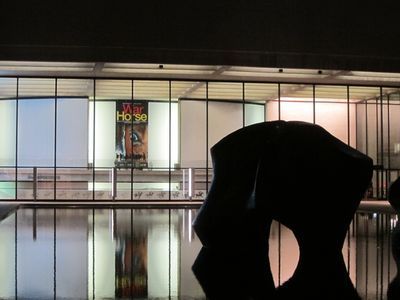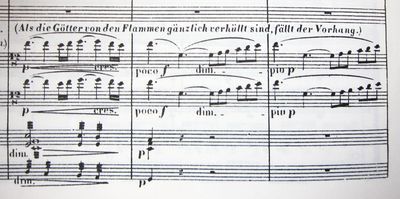Alex Ross's Blog, page 208
December 10, 2011
Putting the classy in classical
David Lang, in liner notes for a fine new Bridge recording of Morton Feldman's Piano and String Quartet (with Vicki Ray and the Eclipse Quartet), describes the dress rehearsal for the premiere of Feldman's Coptic Light, at the New York Philharmonic in 1986: "The orchestra, reacting to the music's extreme focus and restraint, booed him, threw their orchestral parts around, and literally barked at him like dogs." The incident recalls the Philharmonic's notorious misbehavior at the 1964 premiere of Cage's Atlas Eclipticalis — an episode meticulously recounted in Benjamin Piekut's recent book Experimentalism Otherwise. (Here's a pdf excerpt.) The current Philharmonic is, happily, more professional in its approach to new music.
December 9, 2011
Statement from James Levine
A press release just received from the Metropolitan Opera states that James Levine has withdrawn from all Met engagements through the end of the season. Fabio Luisi will take over the complete presentations of Wagner's Ring in April and May.
Levine's statement in full:
Early last summer I had to undergo three back surgeries to address a condition known as stenosis, from which I was suffering a great deal of pain. The issue has been successfully resolved, and I am no longer in any pain. But at the end of August, just a week before I was to begin rehearsing at the Met, I fell and injured my spinal cord, which required emergency surgery. Fortunately none of the earlier surgeries were compromised. Since then I have been in the hospital on a regimen of rehabilitation and intense physical therapy. After three months, I will finally return home at the beginning of next week but will continue the rehab and therapy as an out-patient.
Spinal cord injuries are well-known for taking a long time to heal. No two people recover at the same rate and the rehab typically is over a long period. Although my doctors and therapists have been very pleased with my progress, and I see the positive results, I am frustrated that I am not yet approaching a complete recovery. However, based on my progress during the initial phase of recovery, my doctors and therapists feel that, given time and continued therapy, the prognosis is excellent.
Since the Met must plan its seasons far in advance, I am now in the position of having to predict when I will again be ready to conduct. I have met at length with Peter Gelb and other members of the Met family to discuss this. We have come to the conclusion that it would be profoundly unfair to the public and the Met company to announce a conducting schedule for me that may have to be altered at a later date. I do not want to risk having to withdraw from performances after the season has been announced and tickets sold.
With that in mind, I have reluctantly decided not to schedule performances until I am certain I can fulfill such obligations. The Met's 2012-13 season needs to be finalized, and the best conductors available must be contracted now. As my condition improves, I feel confident I will be ready to conduct again soon, but I cannot risk a premature announcement. It is disappointing to come to this conclusion, but I know it is the right one.
On a more positive note, I look forward to resuming my other responsibilities as Music Director. I will continue to collaborate with Peter Gelb on long-term artistic plans, work with the artistic administration on future planning, coach singers, and work with the participants in the Lindemann Young Artist Development program.
I am particularly grateful to Fabio Luisi and the other conductors who have taken over my duties, often on short notice, and I am delighted that Fabio is now a more permanent part of the Met team in the important role of Principal Conductor.
Apex 2011
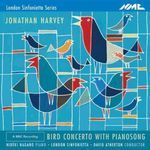 On the New Yorker website, I'm offering a year-end list of ten exceptional recordings. No, I don't like lists either, but it's one more way to salute good work. I'd like to append various honorable mentions, to wit: Jonathan Harvey's Bird Concerto with Pianosong (NMC); Ensemble Plus Ultra's Victoria edition (DG); Alex Mincek's Pendulum V and Third Quartet (Carrier); Saariaho's Clarinet Concerto (Ondine); recitals by Joseph Calleja and Aleksandra Kurzak (both Decca); yMusic's Beautiful Mechanical (New Amsterdam); Weinberg's The Passenger (Neos); Feldman's Orchestra and other pieces (Mode); Beethoven's "Archduke" live from Marlboro (Marlboro Recording Society); Meredith Monk's Songs of Ascension (ECM); Donnacha Dennehy's Grá agus Bás (Nonesuch); and Handel's Ariodante (Virgin Classics). Yet more recordings are listed on my CD Picks page. I didn't get to hear much in the non-classical arena this year, but my ears warmed to Björk's Biophilia, Radiohead's The King of Limbs, St. Vincent's Strange Mercy, WOLD's Freermasonry (hat tip Brandon), Ricardo Villalobos and Max Loderbauer's Re: (hat tip SFJ), Nettle's El Resplandor, Reuben Butchart's Nameless and Awake, and the Roots' Undun. (For a magisterial display of pluralistic taste, see Seth Colter Walls's list.)
On the New Yorker website, I'm offering a year-end list of ten exceptional recordings. No, I don't like lists either, but it's one more way to salute good work. I'd like to append various honorable mentions, to wit: Jonathan Harvey's Bird Concerto with Pianosong (NMC); Ensemble Plus Ultra's Victoria edition (DG); Alex Mincek's Pendulum V and Third Quartet (Carrier); Saariaho's Clarinet Concerto (Ondine); recitals by Joseph Calleja and Aleksandra Kurzak (both Decca); yMusic's Beautiful Mechanical (New Amsterdam); Weinberg's The Passenger (Neos); Feldman's Orchestra and other pieces (Mode); Beethoven's "Archduke" live from Marlboro (Marlboro Recording Society); Meredith Monk's Songs of Ascension (ECM); Donnacha Dennehy's Grá agus Bás (Nonesuch); and Handel's Ariodante (Virgin Classics). Yet more recordings are listed on my CD Picks page. I didn't get to hear much in the non-classical arena this year, but my ears warmed to Björk's Biophilia, Radiohead's The King of Limbs, St. Vincent's Strange Mercy, WOLD's Freermasonry (hat tip Brandon), Ricardo Villalobos and Max Loderbauer's Re: (hat tip SFJ), Nettle's El Resplandor, Reuben Butchart's Nameless and Awake, and the Roots' Undun. (For a magisterial display of pluralistic taste, see Seth Colter Walls's list.)
 I'd also like to mention some notable music books from the past year, many of which I planned to write about on the blog and lamentably failed to cover. These are: Will Hermes's Love Goes to Buildings on Fire, Wendy Lesser's Music for Silenced Voices, Rob Young's Electric Eden, the late Ellen Willis's Out of the Vinyl Deeps, Michael Broyles's Beethoven in America, Sabine Feisst's Schoenberg's New World, Dermot Gault's The New Bruckner, Bálint András Varga's Three Questions for Sixty-Five Composers, Elizabeth Eva Leach's Guillaume de Machaut, Patricia Hall's Berg's Wozzeck, Vincent Giroud's French Opera, and, in the fictional-composer division, Wesley Stace's widely and deservedly adored Charles Jessold, Considered as a Murderer. Glenn Watkins's The Gesualdo Hex came out in 2010, not 2011, but I'll tout it here anyway, for reasons that will become apparent when The New Yorker hits the newsstands next week. (Yes, Gesualdo approaches.)
I'd also like to mention some notable music books from the past year, many of which I planned to write about on the blog and lamentably failed to cover. These are: Will Hermes's Love Goes to Buildings on Fire, Wendy Lesser's Music for Silenced Voices, Rob Young's Electric Eden, the late Ellen Willis's Out of the Vinyl Deeps, Michael Broyles's Beethoven in America, Sabine Feisst's Schoenberg's New World, Dermot Gault's The New Bruckner, Bálint András Varga's Three Questions for Sixty-Five Composers, Elizabeth Eva Leach's Guillaume de Machaut, Patricia Hall's Berg's Wozzeck, Vincent Giroud's French Opera, and, in the fictional-composer division, Wesley Stace's widely and deservedly adored Charles Jessold, Considered as a Murderer. Glenn Watkins's The Gesualdo Hex came out in 2010, not 2011, but I'll tout it here anyway, for reasons that will become apparent when The New Yorker hits the newsstands next week. (Yes, Gesualdo approaches.)
The Rest Is Noise Persons of the Year are Jane Moss and Tom Morris, for their hearteningly inventive programming at Lincoln Center and Spring for Music/Ojai.
While I'm rambling on in this listy fashion, I'll name a few favorite novels (Amy Waldman's The Submission, Alan Hollinghurst's The Stranger's Child), non-fiction books (Joan Didion's Blue Nights, Roger Ebert's Life Itself), and TV shows (Breaking Bad, Homeland, Bored to Death), as well as a favorite film, The Tree of Life. The best film of 2012 will be Jonathan Lisecki's Gayby.
December 8, 2011
Miscellany: Heras-Casado, Darmstadt, etc.
The Orchestra of St. Luke's has achieved a coup in hiring the gifted young Spanish conductor Pablo Heras-Casado as its next principal conductor. He made his Berlin Philharmonic debut earlier this fall and has drawn praise for several New York-area appearances; I admired his pinpoint, dynamic work with ICE at an all-Stravinsky concert at Mostly Mozart last summer. He will lead Ensemble ACJW on Dec. 16.... Over the next few days, ISSUE Project Room is hosting another "Darmstadt" festival, highlighting classics of the international avant-garde. Feldman's For Christian Wolff is heard tonight; on Saturday there will be the annual reading of Terry Riley's In C, which, ironically, was greeted as a hoax when it was played in Darmstadt in 1969. But the most notable event will occur on Friday night, when Joe Drew, of Analog Arts, presents the New York premiere of Stockhausen's final electronic piece, Cosmic Pulses, and picks up his trumpet to perform the "Trompete" section of Orchestra Finalists, from Mittwoch.... Andrew Patner reports that Andreas Mitisek will succeed Brian Dickie as the general director of Chicago Opera Theater, one of America's most vigorous small companies. Mitisek retains his current post as head of the Long Beach Opera.... James Matheson has received the hefty Charles Ives Living award from the American Academy of Arts and Letters. His Violin Concerto will receive its premiere at the Chicago Symphony next week.... Dominic Irving's contemporary-classical Bullshit Generator is endless fun for the whole family. ("My latest composition explores the boundaries between spaces and elements," etc.) Several program notes at the recent SONiC Festival may have been generated with a beta version of this software.... Listen online to a striking new piece by Andrew Norman, courtesy of Orpheus.
December 7, 2011
Dutilleux wins Kravis Prize
 At a ceremony in Paris today, Alan Gilbert and Zarin Mehta, the music director and the president of the New York Philharmonic, are presenting the inaugural Marie-Josée Kravis Prize for New Music to the venerable French composer Henri Dutilleux, who turns ninety-six next month. Explains the press release: "The Kravis Prize is to be awarded every two years, and each honoree is to receive a cash grant of $200,000 and a commission to write a work for the New York Philharmonic. In alternating years, when no prize is given, an emerging composer will receive a $50,000 stipend to commission a work for the Orchestra...This year Mr. Dutilleux will share the proceeds with three composers whom the New York Philharmonic will select with his assistance, each of whom will write a work to be performed by the Orchestra in his honor (in lieu of a new work by Mr. Dutilleux)." The first of the three composers is Peter Eötvös, whose commission will have its premiere in a future season. On June 26, 2012, the Philharmonic will celebrate Dutilleux with a concert consisting of his works Métaboles, Ainsi la nuit, and Tout un monde lointain — the last with Yo-Yo Ma as soloist.
At a ceremony in Paris today, Alan Gilbert and Zarin Mehta, the music director and the president of the New York Philharmonic, are presenting the inaugural Marie-Josée Kravis Prize for New Music to the venerable French composer Henri Dutilleux, who turns ninety-six next month. Explains the press release: "The Kravis Prize is to be awarded every two years, and each honoree is to receive a cash grant of $200,000 and a commission to write a work for the New York Philharmonic. In alternating years, when no prize is given, an emerging composer will receive a $50,000 stipend to commission a work for the Orchestra...This year Mr. Dutilleux will share the proceeds with three composers whom the New York Philharmonic will select with his assistance, each of whom will write a work to be performed by the Orchestra in his honor (in lieu of a new work by Mr. Dutilleux)." The first of the three composers is Peter Eötvös, whose commission will have its premiere in a future season. On June 26, 2012, the Philharmonic will celebrate Dutilleux with a concert consisting of his works Métaboles, Ainsi la nuit, and Tout un monde lointain — the last with Yo-Yo Ma as soloist.
The future of Best Music
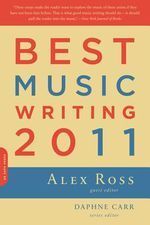 At the first Best Music Writing 2011 reading at powerHouse Arena last night — another happens at Housing Works Café tomorrow night — eight contributors addressed the crowd. Kelefa Sanneh analyzed hip-hop lyrics; Dave Tompkins recounted his surreal visit to a National Security Agency cryptology symposium, in connection with his history of the Vocoder, How to Wreck a Nice Beach; Lauren Puchowski described the difficult life of a Washington, DC wedding singer in a plug-in-your-iPod age; Franklin Bruno spoke in praise of Felice and Boudleaux Bryant, the celebrated Nashville songwriting team; Wendy Lesser recalled her encounter with Georg Friedrich Haas's in-the-dark Third Quartet; Nitsuh Abebe, whose BMW piece is on CocoRosie, read aloud from a recent review of Lou Reed and Metallica's Wedekind album; Sasha Frere-Jones, whose BMW piece is on Sade, explored a curious nineteen-seventies anthology of anxious ruminations on pop music and youth; and Vanessa Grigoriadis gave a wryly admiring account of her meetings with Lady Gaga. Jeremy Denk was also scheduled to appear, but rehearsals with the Chicago Symphony understandably took precedence.
At the first Best Music Writing 2011 reading at powerHouse Arena last night — another happens at Housing Works Café tomorrow night — eight contributors addressed the crowd. Kelefa Sanneh analyzed hip-hop lyrics; Dave Tompkins recounted his surreal visit to a National Security Agency cryptology symposium, in connection with his history of the Vocoder, How to Wreck a Nice Beach; Lauren Puchowski described the difficult life of a Washington, DC wedding singer in a plug-in-your-iPod age; Franklin Bruno spoke in praise of Felice and Boudleaux Bryant, the celebrated Nashville songwriting team; Wendy Lesser recalled her encounter with Georg Friedrich Haas's in-the-dark Third Quartet; Nitsuh Abebe, whose BMW piece is on CocoRosie, read aloud from a recent review of Lou Reed and Metallica's Wedekind album; Sasha Frere-Jones, whose BMW piece is on Sade, explored a curious nineteen-seventies anthology of anxious ruminations on pop music and youth; and Vanessa Grigoriadis gave a wryly admiring account of her meetings with Lady Gaga. Jeremy Denk was also scheduled to appear, but rehearsals with the Chicago Symphony understandably took precedence.
I don't know of any other venue where non-academic music writers from so many different genres can intermingle — and that's why the Best Music Writing series is so valuable. At the end of the evening, Daphne Carr, who has served as series editor since 2006, made the ostensibly sad announcement that Da Capo Press has decided to cease publication of the book. This is not the end, though. Daphne will carry on, re-launching Best Music Writing as the flagship title of what she describes as a "new, music-writing-focused press." A committee of ten writers will assist her in culling pieces for the book, extending its already wide geographical and stylistic reach. She is seeking to raise $30,000. Anyone who gives $15 or more will receive a copy of the 2012 edition. There are more details at Daphne's blog. I urge interested readers to support the project. Best Music Writing has become a significant institution in the crisis-ridden world of music criticism, and it should go on.
December 5, 2011
Anniversary
I have now been the music critic of The New Yorker for fifteen years. I'd like to express intense gratitude to the magazine for hiring me, improving me, and letting me roam free. I would especially like to thank Daniel Zalewski, the most passionate and discerning editor in the realm.
Rossini the progressive
Last week at Carnegie Hall, the Collegiate Chorale presented a concert performance of Moïse et Pharaon — Rossini's 1827 revision, for the Paris Opéra, of his 1818 Biblical drama Mosè in Egitto. John Yohalem and Zachary Woolfe have reports. It was my first live encounter with the piece, and I was especially fascinated by the ending: an orchestral epilogue that depicts the parting of the Red Sea and the subsequent drowning of the Egyptians. ("Exterminons une coupable race!" exclaims Aménophis as he leads them to their doom — "Let us exterminate a culpable race!") David Shengold, whose review is forthcoming, remarked afterward on the resemblance of this finale to that of Götterdämmerung — another apocalypse in the major mode. I had the same thought, and was also struck by the peculiar harmonies that Rossini deployed in the last two pages of the score. Just before the end, the lower strings twice play a descending figure – C, B-flat, A-natural, A-flat — over a pedal-point C. Nothing unusual in that, but with the addition of other instrumental voices a piercing dissonance arises: a chord of C, A-flat, B-natural, F, and E-natural, containing two clashing major sevenths. You can hear this passage at 5:53 in the Riccardo Muti video above:
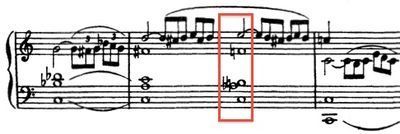
Then, in the following bars, double basses and bassoons twice intone the figure C, B-flat, A-flat, G, a classic "lamento" motif that one would expect to find in the key of C minor. But the remainder of the orchestra resolves to C major, creating an uneasy ambiguity, a sense of lingering shadows. After that, three quiet C-major chords, and silence. In the original performing material at the Opéra, there follows a cantique of thanksgiving for the Israelites —"Chantons, bénissons le Seigneur" — but during the rehearsal period Rossini decided to cut that piece, preferring to close with the hushed, eerie music of the Red Sea rising. (My information on this point comes from the great opera scholar Philip Gossett.) I'm hard pressed to think of a precedent: it's a stroke of startling originality.
As for Wagner, he did admire Rossini's Moses music, and very likely saw the French version during one of his Parisian stays. He mentioned the score, along with William Tell, at his famous meeting with Rossini in 1860, during which the old master was surprised to learn that he had anticipated the art of endless melody. ("So I made music of the future without knowing it," Rossini remarked, no doubt with a smile.) Although it's a bit of a stretch, you might be able to see a kinship between the final gesture of Götterdämmerung — the "O hehrstes Wunder" melody unfurling regally over a stepwise descending figure — and the music for the Egyptians' demise.
Readers are welcome to locate their own ironies.
December 4, 2011
Thought of the day
"Instead of asking 'Is it right?' we are tempted to ask 'Will it pay?' and 'Will it win?' As a result the public conscience is becoming seared and the public service debauched."
— William Jennings Bryan, "The Value of an Ideal," 1901
Traffic report
November 2011 was the busiest month to date in the seven-year life of www.therestisnoise.com. The blog had 175701 page loads, 133489 unique visitors, and 34560 returning visitors. If anyone is curious to know, the share of visitors from the United States tends to hover around 50%, usually falling a bit under. On average, about ten percent of readers are from the UK; I also get many visits from Spain, Italy, France, Germany, and Brazil. As ever, thank you all for paying me mind.
Alex Ross's Blog
- Alex Ross's profile
- 425 followers


